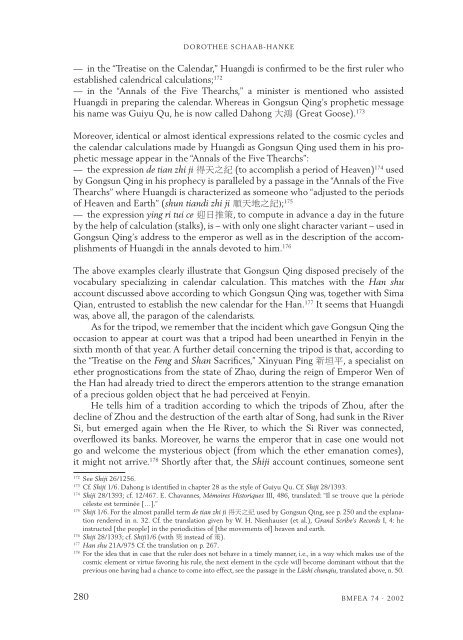The Power of an Alleged Tradition - CHINA Buchservice
The Power of an Alleged Tradition - CHINA Buchservice
The Power of an Alleged Tradition - CHINA Buchservice
You also want an ePaper? Increase the reach of your titles
YUMPU automatically turns print PDFs into web optimized ePapers that Google loves.
— in the “Treatise on the Calendar,” Hu<strong>an</strong>gdi is confi rmed to be the fi rst ruler who<br />
established calendrical calculations; 172<br />
— in the “Annals <strong>of</strong> the Five <strong>The</strong>archs,” a minister is mentioned who assisted<br />
Hu<strong>an</strong>gdi in preparing the calendar. Whereas in Gongsun Qing’s prophetic message<br />
his name was Guiyu Qu, he is now called Dahong ���(Great Goose). 173<br />
Moreover, identical or almost identical expressions related to the cosmic cycles <strong>an</strong>d<br />
the calendar calculations made by Hu<strong>an</strong>gdi as Gongsun Qing used them in his prophetic<br />
message appear in the “Annals <strong>of</strong> the Five <strong>The</strong>archs”:<br />
— the expression de ti<strong>an</strong> zhi ji����� (to accomplish a period <strong>of</strong> Heaven) 174 used<br />
by Gongsun Qing in his prophecy is paralleled by a passage in the “Annals <strong>of</strong> the Five<br />
<strong>The</strong>archs” where Hu<strong>an</strong>gdi is characterized as someone who “adjusted to the periods<br />
<strong>of</strong> Heaven <strong>an</strong>d Earth” (shun ti<strong>an</strong>di zhi ji�������; 175<br />
— the expression ying ri tui ce�����, to compute in adv<strong>an</strong>ce a day in the future<br />
by the help <strong>of</strong> calculation (stalks), is – with only one slight character vari<strong>an</strong>t – used in<br />
Gongsun Qing’s address to the emperor as well as in the description <strong>of</strong> the accomplishments<br />
<strong>of</strong> Hu<strong>an</strong>gdi in the <strong>an</strong>nals devoted to him. 176<br />
<strong>The</strong> above examples clearly illustrate that Gongsun Qing disposed precisely <strong>of</strong> the<br />
vocabulary specializing in calendar calculation. This matches with the H<strong>an</strong> shu<br />
account discussed above according to which Gongsun Qing was, together with Sima<br />
Qi<strong>an</strong>, entrusted to establish the new calendar for the H<strong>an</strong>. 177 It seems that Hu<strong>an</strong>gdi<br />
was, above all, the paragon <strong>of</strong> the calendarists.<br />
As for the tripod, we remember that the incident which gave Gongsun Qing the<br />
occasion to appear at court was that a tripod had been unearthed in Fenyin in the<br />
sixth month <strong>of</strong> that year. A further detail concerning the tripod is that, according to<br />
the “Treatise on the Feng <strong>an</strong>d Sh<strong>an</strong> Sacrifi ces,” Xinyu<strong>an</strong> Ping ���, a specialist on<br />
ether prognostications from the state <strong>of</strong> Zhao, during the reign <strong>of</strong> Emperor Wen <strong>of</strong><br />
the H<strong>an</strong> had already tried to direct the emperors attention to the str<strong>an</strong>ge em<strong>an</strong>ation<br />
<strong>of</strong> a precious golden object that he had perceived at Fenyin.<br />
He tells him <strong>of</strong> a tradition according to which the tripods <strong>of</strong> Zhou, after the<br />
decline <strong>of</strong> Zhou <strong>an</strong>d the destruction <strong>of</strong> the earth altar <strong>of</strong> Song, had sunk in the River<br />
Si, but emerged again when the He River, to which the Si River was connected,<br />
overfl owed its b<strong>an</strong>ks. Moreover, he warns the emperor that in case one would not<br />
go <strong>an</strong>d welcome the mysterious object (from which the ether em<strong>an</strong>ation comes),<br />
it might not arrive. 178 Shortly after that, the Shiji account continues, someone sent<br />
172 See Shiji 26/1256.<br />
173 Cf. Shiji 1/6. Dahong is identifi ed in chapter 28 as the style <strong>of</strong> Guiyu Qu. Cf. Shiji 28/1393.<br />
174 Shiji 28/1393; cf. 12/467. E. Chav<strong>an</strong>nes, Mémoires Historiques III, 486, tr<strong>an</strong>slated: “Il se trouve que la période<br />
céleste est terminée […].”<br />
175 Shiji 1/6. For the almost parallel term de ti<strong>an</strong> zhi ji����� used by Gongsun Qing, see p. 250 <strong>an</strong>d the expl<strong>an</strong>ation<br />
rendered in n. 32. Cf. the tr<strong>an</strong>slation given by W. H. Nienhauser (et al.), Gr<strong>an</strong>d Scribe’s Records I, 4: he<br />
instructed [the people] in the periodicities <strong>of</strong> [the movements <strong>of</strong>] heaven <strong>an</strong>d earth.<br />
176 Shiji 28/1393; cf. Shiji1/6 (with � instead <strong>of</strong> �).<br />
177 H<strong>an</strong> shu 21A/975 Cf. the tr<strong>an</strong>slation on p. 267.<br />
178 For the idea that in case that the ruler does not behave in a timely m<strong>an</strong>ner, i.e., in a way which makes use <strong>of</strong> the<br />
cosmic element or virtue favoring his rule, the next element in the cycle will become domin<strong>an</strong>t without that the<br />
previous one having had a ch<strong>an</strong>ce to come into effect, see the passage in the Lüshi chunqiu, tr<strong>an</strong>slated above, n. 50.<br />
280<br />
DOROTHEE SCHAAB-HANKE<br />
BMFEA 74 · 2002


